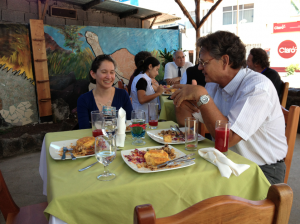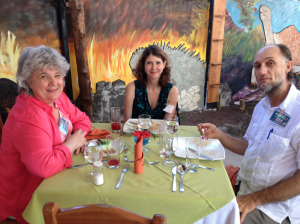Ecuador was a gracious host to the Sixth Conference of the Parties. The local cooking school of gastronomy kindly offered lunch for the visiting Parties, showing off beautiful local food traditions. Pictured below, aspiring chefs on the island often train at the school in preparation for careers in the local restaurant industry. Their cooking typically featured fish and seafood from nearby shores and the use of unique island spices.
Later in the evening, after the adjournment of the Conference for the day, Ecuador presented a live performance of traditional music and dance. The music featured tambourines, drums, rattles, and melodies played on wooden flutes. The lyrics praised the treasured beauty of the island’s wonders and the joy it brings to all. One of the oldest songs they performed highlighted Pelican Bay. The song warns that all who drink from these mythical waters will never leave or forever be returning. Following the musicians, Ecuadorian dancers performed dances from both the mainland and the islands. Their final dance was one of friendship as the dancers welcomed the Delegates into a circle of dancing friends.
The evening gathering allowed observers and delegates to become acquainted and discuss the proceedings of the day. In addition to meeting the United States delegates, I had the opportunity to meet the representatives from Argentina and Panama. The Argentinean delegate recently returned from studying marine life in Antarctica and he had spent his entire life trying to conserve endangered sea species. His hopes for the Conference were resolution of long-standing conflicts, for example the Secretariat’s legal personality and its permanent location so the Conference could move on to implementing more conservation programs. The delegate from Panama, while interested in the Convention’s operations, was particularly focused on receiving an exemption for some of the beaches of his country because of their tradition of harvesting turtles and eggs for food. The Convention, understanding that some local economies in poverty-stricken areas are dependent on turtle and turtle egg harvesting, occasionally grant exceptions to the text of their treaty. Guatemala and Panama were both seeking exemption for some of their beach regions in exchange for more proactive defense against poachers on other beaches and for a greater promotion of the importance and conservation of sea turtles throughout their countries. In all, the evening proved a wonderful introduction to both Ecuadorian and Galapagos culture as well as the unique conservation perspectives of other delegates.
Here pictured on the left is the chair and member of the U.S. delegation, Alexis Gutierrez, and on the left is the delegate from The Netherlands.
Here pictured on the left is Dr. Karen Eckert, executive director of WIDECAST. Pictured right is Ms. Rebecca Regnery of the International Humane Society. Pictured right is the interpreter and translator for the Conference, Mr. Sam.



